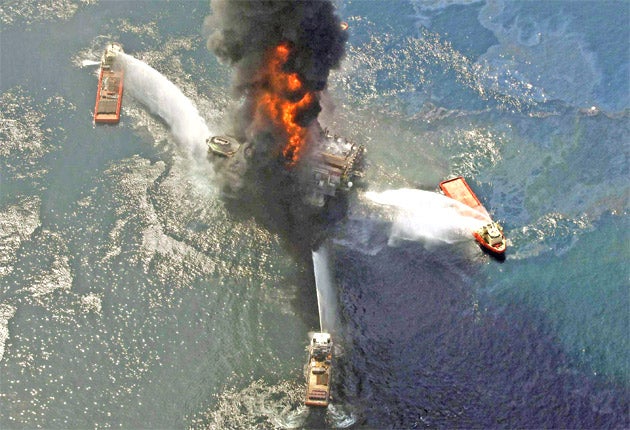Your support helps us to tell the story
From reproductive rights to climate change to Big Tech, The Independent is on the ground when the story is developing. Whether it's investigating the financials of Elon Musk's pro-Trump PAC or producing our latest documentary, 'The A Word', which shines a light on the American women fighting for reproductive rights, we know how important it is to parse out the facts from the messaging.
At such a critical moment in US history, we need reporters on the ground. Your donation allows us to keep sending journalists to speak to both sides of the story.
The Independent is trusted by Americans across the entire political spectrum. And unlike many other quality news outlets, we choose not to lock Americans out of our reporting and analysis with paywalls. We believe quality journalism should be available to everyone, paid for by those who can afford it.
Your support makes all the difference.The explosion which caused the Gulf of Mexico oil spill took place shortly after a man who was monitoring vital safety equipment decided to leave his workstation for a cigarette break.
Joseph E Keith, an employee of the Halliburton subsidiary Sperry Sun, told investigators that he failed torealise that the well was filling with dangerous levels of crude oil and natural gas because he was in the canteen, having a smoke and a cup of coffee.
By the time Mr Keith had resumed watching his monitors, which were tracking pressure levels on the Deepwater Horizon rig, the safety gauges had returned to normal, according to testimony he gave to the joint Coast Guard-Interior Department panel in Houston.
Not long afterwards, a huge explosion on the BP rig killed 11 people, injured 17 others, and caused oil to begin leaking into the Gulf. Over the ensuing three months, some 206 million gallons were released, in what is believed to be the worst accidental spill in history.
Mr Keith had worked on the Deepwater Horizon for eight years as a "mud logger", whose job was to monitor the flow of mud out of the well to ensure there were no build-ups of hydrocarbons or other volatile substances. He had 30 years of experience in the industry.
On the day of the blow-out, he recalled being "uncomfortable" with the number of activities taking place on the rig. "They were moving a lotof mud around," he said, meaningthat it became difficult to keep track of the mud that was leaving the well.
The fatal cigarette break lasted 10 minutes, and saw him smoke just half of his cigarette before returning to his workstation. Had Mr Keith seen the pressure data which had emerged during his absence, he "would have called the rig floor" to warn colleagues that they were in danger.
He did not hear the subsequent explosion and only realised something was seriously amiss half an hour later, when the screens he used to monitor drilling fluid in the small trailer where he worked began to bend and stretch due to intense heat. An air-conditioning unit in the ceiling then melted.
When he ran on to the deck of the stricken rig, Mr Keith discovered the body of a dead co-worker. He survived the ensuing fire, along with 114 other employees of BP and its myriad subcontractors, by boarding a life raft.
The eight-person Coastguard panel which heard his testimony is this week holding its sixth round of hearings into this summer's disaster. A separate inquiry by a White House commission is also ongoing, although members say their efforts to find out what went wrong are being obstructed by one of BP's leading suppliers, National Oilwell Varco.
Investigators for the panel say their efforts to recreate what dead crew members on the rig saw on their monitors on the day of the disaster are being hindered by the equipment supplier's failure to provide crucial information and assistance.
"For over a month, we have attempted to elicit National Oilwell Varco's assistance on this matter," they said in a letter to commissioners. "They have been generally unco-operative, either in the form of refusal or delay."

Join our commenting forum
Join thought-provoking conversations, follow other Independent readers and see their replies
Comments